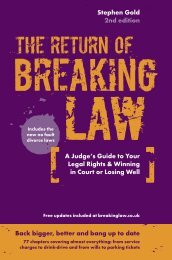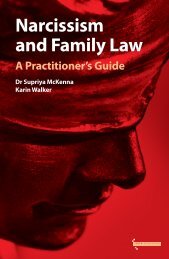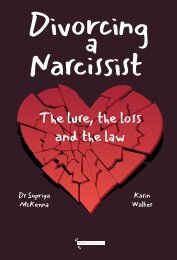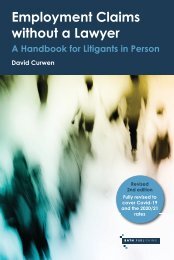Insolvency Made Clear: A Guide for Debtors
Plain English, practical guidance for anyone facing demands over a debt they are struggling to pay.
Plain English, practical guidance for anyone facing demands over a debt they are struggling to pay.
You also want an ePaper? Increase the reach of your titles
YUMPU automatically turns print PDFs into web optimized ePapers that Google loves.
Effect Of Bankruptcy<br />
2.10 Running the bankrupt’s business<br />
The bankrupt’s business, although not any tools of trade, will fall into the estate.<br />
A Trustee might decide that it is in the best interests of the creditors <strong>for</strong> the<br />
bankrupt’s business to be sold to a third party. This might happen if, <strong>for</strong> example,<br />
the business is incorporated and it is possible to sell the shares of the company.<br />
However, the Trustee is also able to run the business themselves, or appoint<br />
a manager (including the bankrupt) to do so on their behalf. This creates an<br />
opportunity <strong>for</strong> the bankrupt to offer their services running the business as they<br />
were doing previously. However, since the bankrupt was not so successful at<br />
running the business, otherwise they would not be made bankrupt, a Trustee<br />
may be cautious be<strong>for</strong>e agreeing to this proposal.<br />
A bankrupt is not prohibited from starting a new business in the same industry<br />
provided they can do so within the constraints of bankruptcy, including a) not<br />
being able to act as the director of a company, b) restrictions on the ability to<br />
borrow as above, and c) many of the assets of the previous business will now vest<br />
in the Trustee. The Trustee in Bankruptcy cannot compel the previous customers<br />
to trade with them and not the bankrupt. The rules on after-acquired property<br />
(to be discussed below) do not apply to property acquired by the bankrupt<br />
in the ordinary course of their business (r10.125(4)), but the bankrupt must<br />
share accounting and profit in<strong>for</strong>mation with the Trustee.<br />
If the bankrupt engages in business, they must trade under the name in which<br />
they were made bankrupt (s360(1)(b) of the Act). This is similar to the restriction<br />
on obtaining credit: it only imposes the obligation to disclose relevant<br />
in<strong>for</strong>mation.<br />
2.11 Effect on immigration status<br />
Due to s41A of the British Nationality Act 1981, in most circumstances, a person<br />
applying <strong>for</strong> British citizenship must meet a ‘good character’ requirement. This<br />
includes ‘consideration of financial soundness’. The Home Office guidance on<br />
this requirement can be found at https://assets.publishing.service.gov.uk/government/uploads/system/uploads/attachment_data/file/770960/good-character-guidance.pdf.<br />
An application will not usually be refused simply because the person is in debt.<br />
However, the application <strong>for</strong>m, Form AN, asks at question 3.14 “Have you ever<br />
been declared bankrupt?”. The guidance explains that if the bankruptcy was discharged<br />
over ten years ago, annulled or if the individual was the director of a<br />
company that went into liquidation (presumably when insolvent) over ten years<br />
ago, the application can be granted. Otherwise, the Home Office reviewer will<br />
take into account the scale of the bankruptcy, the economic circumstances at the<br />
time of the application, and make a judgement about whether the person was<br />
29













